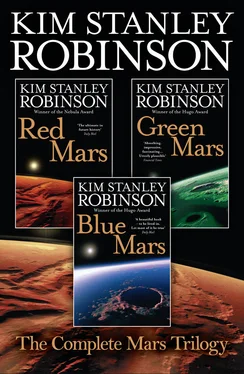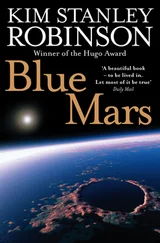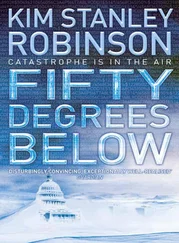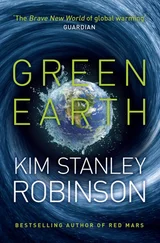One room contained a crowd of Egyptians, not like his Sufis but orthodox Moslems, talking like the wind and drinking cups of coffee, high on caffeine and sunlight, flashing white smiles under their moustaches, extremely cordial for once, in fact pleased to see him there. He warmed to that, and flying on the momentum of the day he said, “Look, we’re part of a new world. If you don’t base your actions on Martian reality then you become a kind of schizophrenic, with your body on one planet and your spirit on another. No society split like that can function for long.”
“Well, well,” one of them said with a smile. “You must understand we have traveled before. We are a traveling people. But wherever we are, Mecca is our spirit’s home. We could fly to the other side of the universe and that would still be true.”
Nothing to say to that; and in fact such direct honesty was so much cleaner than what he had been dealing with through the night that he nodded, and said, “I see. I understand.” Compare that after all to the hypocrisy of the West, where people talked of profit at prayer breakfasts, people who couldn’t articulate a single belief they had; people who thought their values were physical constants, who would say “That’s just the way things are,” like Frank so often did.
So John stayed and talked with the Egyptians for a while, and when he left them he was feeling better. He wandered back to his vault, listening to the rowdy voices pouring into the hallway from every room; shouts, shrieks, happy scientist talk, “these things are such halophytes that they don’t like brine because there’s too much water in it,” peals of laughter.
He had an idea. Spencer Jackson lived in the vault next door to John’s, and was passing through when John hurried in, so John told him the idea. “We ought to gather everyone we can for a big celebration of the storm’s end. All the sort-of Mars-centered groups, you know, or really everyone who can possibly make it. Anyone who wants to be there.”
“Where?”
“Up on Olympus Mons,” he said without considering it. “We could probably get Sax to time the arrival of his ice asteroid so that we could watch it from there.”
“Good idea!” Spencer said.
Olympus Monsis a shield volcano, and therefore a cone that is not steep in most places, its great height resulting from its even greater breadth; it is twenty-five kilometers higher than the surrounding plain, but eight hundred kilometers across, so its slope averages about six degrees. But around the circumference of its great bulk there is a circular escarpment some seven kilometers high, and this spectacular cliff, twice as tall as that at Echus Overlook, is in many places close to vertical. Sections of it had already lured the few climbers on the planet, but no one had yet succeeded in climbing it, and for most of the inhabitants of the planet it remained merely a spectacular impediment on the way to the summit caldera. Travelers on the ground made it up the escarpment by way of a wide ramp on the north side, where one of the last lava flows had overrun the cliff – areologists told tales of what it must have been like, of a river of molten rock a hundred kilometers wide, too bright to look at, falling seven thousand meters onto the black lava-crusted plain, piling higher and higher and higher. This spill of lava had left a rampway with nothing more than a slight jog in it where the escarpment had been overrun; it was an easy ascent, and after it, an uphill drive of some two hundred kilometers took one to the rim of the caldera.
The summit rim of Olympus Mons is so broad and flat that while it has an excellent view down into the many-ringed caldera, the rest of the planet cannot be seen from it; looking outward one sees only the outer edge of the rim, and then the sky. But on the south side of the rim there is a small meteor crater, with no name but its map designation, THA-Zp. The interior of this little crater is somewhat sheltered from the thin jet stream rushing over Olympus Mons, and standing on the southern arc of its fresh spiky rim, an observer finally has a view down the slope of the volcano, and then over the vast rising plain of west Tharsis: like looking down at the planet from a platform in low space.
It took almost nine months before the asteroid was brought to a rendezvous with Mars, and word of John’s celebration had had time to get around. So they came in scattered rover caravans, in twos and fives and tens, up the north ramp and around to the southern outer slope of Zp; and they erected a number of big crescent-shaped clear-walled tents, with rigid clear floors that stood two meters off the ground, resting on clear entry stalks. They were the very latest thing in temporary shelter, in fact, and all set with their inner arcs facing uphill, so that when they were done they had a row of crescents stacked like stairs, like greenhouse gardens on a terraced hillside, overlooking the immense sweep of a bronze world. Every day for a week the caravans arrived, and dirigibles labored up the long slope, and were tethered inside Zp, filling it so that the interior of the little crater looked like a bowl of birthday balloons.
The size of the crowd surprised John, as he had expected only a few friends to travel to such a remote site. It was yet another proof of his inability to comprehend the planet’s current population; there were nearly a thousand people gathered there together, it was amazing. Although many were faces he had seen before, and quite a few he knew by name. So it was a collection of friends, in a way. It was as if a home town that he hadn’t known existed had suddenly sprung up around him. And since so many of the first hundred had come, forty of them in all, including Maya and Sax, Ann and Simon and Nadia and Arkady, Vlad and Ursula and the rest of the Acheron group, Spencer, Rya, Alex and Raul and Janet and Mary and Dmitri and Elena and the rest of the Phobos group, and Arnie and Sasha and Yeli and several more, some of whom he hadn’t seen in twenty years – everyone he was close to, in fact, except for Frank, who had said he was too busy, and Phyllis, who hadn’t replied to the invitation at all.
And it wasn’t just the first hundred; many of the others were old friends as well, or friends of friends: a lot of Swiss, including the roadbuilding gypsies; Japanese from all over; most of the Russians on the planet; his Sufi friends; and all of them scattered up and down the terraced crescent tents, in collections of caravan groups and dirigible teams, rushing from time to time to the locks to greet the latest arrivals.
During the days many of them wandered around outside the tents, collecting loose rock from the great curved slope. The Zp meteor’s impact had scattered chunks of brecciated lava everywhere, including shishtovite shattercones like pottery shards, some dead black, others a bright blood red, or flecked with impact diamonds. An areological team from Greece started laying these in a pattern on the ground under the raised floor of their tent, and they had brought a little kiln with them, so they could glaze some shards yellow or green or blue, to accent their designs. This idea caught on as soon as others saw it, and within two days each clear tent floor stood over a flagged parquet with a mosaic design: circuitry maps, pictures of birds and fish, fractal abstracts, Escher drawings, the Tibetan calligraphy spelling Om Mani Padme Hum, maps of the planet and of smaller regions, equations, people’s faces, landscapes, and so on.
John spent his time wandering from tent to tent, talking with people and enjoying the carnival atmosphere – an atmosphere which did not preclude arguments, there were a lot of those – but most people spent the time partying, talking, drinking, going out on excursions on the wavy surface of the old lava flows, making mosaic floors, dancing to music made by various amateur bands. The best of these was a magnesium drum band, the instruments local, the players from Trinidad and Tobago, a notorious transnational flag of convenience with a vigorous local resistance movement of which the band were representatives. There was also a country and western group with a good slide guitar player, and an Irish band with home-made instruments and a large shifting membership, which allowed it to play more or less non-stop. These three bands were all surrounded by crowds of dancers, and indeed the tents they occupied had all of their movement transformed into a kind of pulsing dance, as just getting from here to there was suddenly stuffed with the grace and exuberance of the music, the gravity, the view.
Читать дальше












